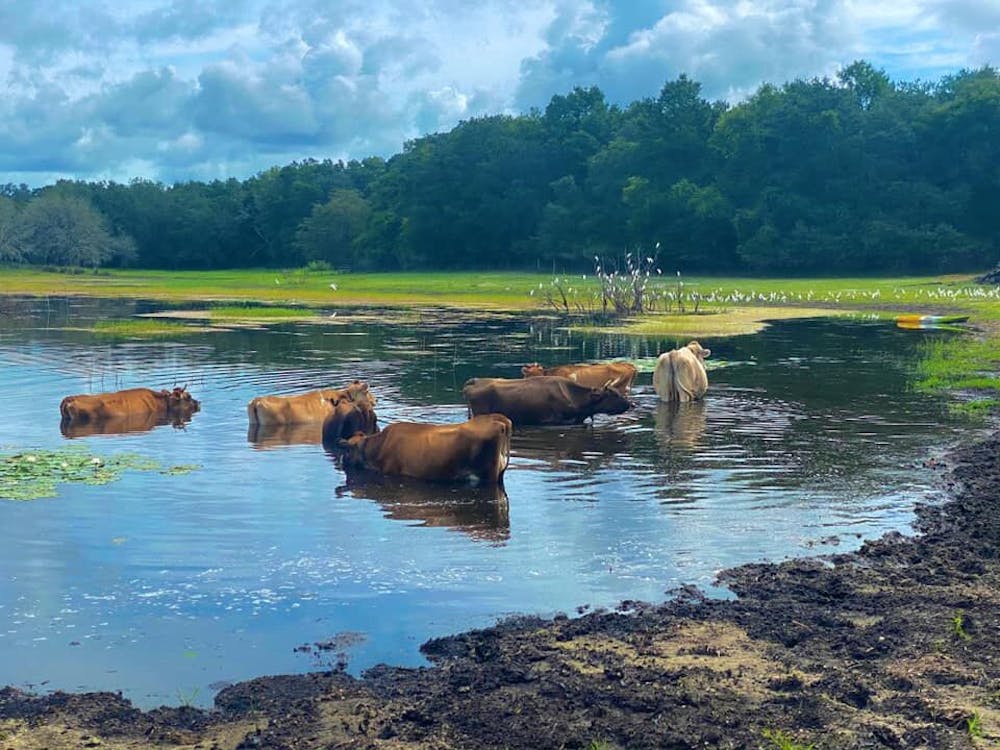Dennis Peters spends his days under cows.
When he’s not milking Essie Lou, Bonnie Sue, Daisy Mae and Dayla Rae or the other nine milking cows, he’s at space number 15 at the Alachua County Farmers’ Market, located at 5920 NW 13th St, on Saturdays, rain or shine.
In a world of uncertainty, local farmers are still planting the seeds to feed Alachua County. The summer is usually a slow season for crops, but when paired with an above-normal hurricane season and a pandemic, it’s a recipe for hardship.
The American Farm Bureau Federation reported on June 18 that 84% of Americans still trust farmers despite the COVID-19 pandemic. However, farmers and producers have witnessed a decline of about $50 billion in the value of their products, according to the U.S. Department of Agriculture.
The USDA also announced the Coronavirus Food Assistance Program, which provided $16 billion to farmers and ranchers who have recently experienced economic difficulty, on April 17.
Peters, owner of Produced on the Farm in Old Town about an hour away from Gainesville, said he had trouble finding jugs for milk and deli-style containers for to-go packaging in May. However, the former Deputy Sheriff of Columbia County, Jefferson County and Suwannee County, said this isn’t an issue anymore.
He also said he hasn’t hasn’t experienced a drop in customers. He believes more people are buying his goods at markets because they’re taking their health more seriously.
To promote his produce, Peters also goes to Haile Farmers Market, located at 5213 SW 91 Terrace, on Saturdays, Grove Street Farmers Market, located at 1001 NW 4 St., on Mondays and Union Street Farmer's Market, now located at Celebration Pointe Avenue, on Wednesdays.
“We kept doing the same thing we did before all this hit, and we’re going to keep doing the same thing when it probably goes away,” Peters said.

County residents have always trusted local producers, and there haven’t been shortages of agricultural commodities or crops in the county, said Cindy Sanders, county extension director at the UF Institute of Food and Agricultural Sciences. Farms have even donated to food banks, nonprofits and local churches.
For about a week or two, meats in local stores in March were in low supply because people panicked and stocked up on food, Sanders said.
“I know several of our meat managers in the stores, and knowing the process, it wasn’t as much as a food shortage,” she said. “It was just people buying the food in advance.”
The Agricultural industry produces 27,000 jobs and is the third largest employer in Alachua County.
“There has been some hiccups, but farming and agriculture has not stopped at all in Alachua County or in the state of Florida,” Sanders said.
Because of loyal customers and a resilient farming community, Alachua County farmers haven’t needed to dump unsold produce as much as those in South Florida, she said.
One local farm, Frog Song Organics in Hawthorne, did have to dump produce.
The farm, at 4317 US 301, which harvests crops like strawberries and greens based on customers' requests, had a surplus of crops like lettuce and radishes because customers did not buy them, said co-founder Amy Van Scoik.
So the farm experienced economic losses from produce never harvested and produce that was dumped.
The farm had federal assistance for crops that were lost due to the virus via the USDA grant, Van Scoik said. Strawberries, lettuce and radishes were among the crops that qualified for the program.
Before the pandemic, the farm worked with restaurants, like East End Eatery and The Top in Gainesville, but as fewer people visited restaurants, orders fell, she said.
“Sales for home delivery increased dramatically, but sales for our restaurants dropped down to almost zero,” she said.
Despite the challenge, Van Scoik didn’t see closing as an option.
“A farm is a living entity, so just because something shuts down, it doesn’t stop the strawberries from being ready to pick or the lettuce being ready to cut,” she said. “You have a very short window when produce is ready to harvest it and sell it.”
Along with her husband, she hired 12 staffers after interviewing about 36 candidates this summer. However, about two staffers quit due to anxiety about exposure to customers and fellow staffers and working outside with masks and gloves on all day.
During the initial shutdown, Van Scoik’s main hardship was finding new ways to sell products because Gainesville closed The Union Street Farmers’ Market — Frog Song’s main way of selling products.

Tinkerbell and her newborn calf.
The non-county associated market closed during March because it wasn’t considered an essential business and had to be closed under Gov. Ron DeSantis’ stay-at-home order, said Charlie Lybrand, founder and director of Union Street Farmers’ Market.
The city wouldn’t allow the 24-year-old market any other place in the city to set up, Lybrand said. He said the market ended up temporarily collaborating with Cypress & Grove Brewing Company but moved to Celebration Pointe Avenue, June 3.
The market, which donates to the Working Food Community Center, a non-profit organization in Gainesville, lost about eight vendors and farmers, he said.
Supermarkets that get produce from a different state or county may have empty shelves if the supply chain is disrupted, Van Scoik said. However, local farms can continue feeding people without interruption because it is easier to adapt.
After the Union Street closure, Van Scoik said Frog Song Organics began working with Grove Street Farmers Market to host pickups, sold products at a drive-thru market with the Working Food Community Center and even opened delivery and sales on their own farm’s location at 4317 NE US Highway 301 in Hawthorne from March until July.
The farm is now closed for construction of an expanded on-farm market that will open in October.
Lybrand reflected on the state of agriculture in the era of the pandemic.
“Farmers are very resilient people,” Lybrand said. “They’re very independent people, and you see it in just the way they’re adapting right now. They create something very essential for society, and everybody has to eat.”

Asta Hemenway is a third-year senior majoring in Journalism. Born in Tallahassee, she grew up Senegalese American. When she’s not writing or doing school, she loves watching Netflix and Tiktok in her spare time.






